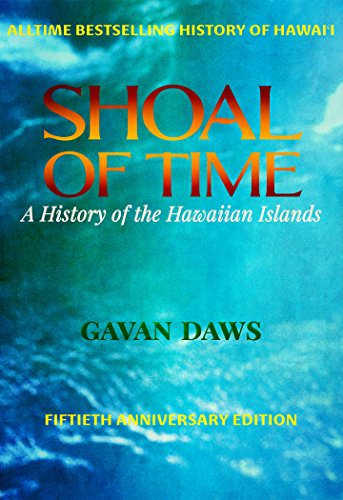Shoal Of Time: A History Of The Hawaiian Islands (Fiftieth Anniversary Edition) / Gavan Daws
| List Price: | |
| Our Price: | |
|
Used Book Price: | |
| Shoal Of Time: A History Of The Hawaiian Islands (Fiftieth Anniversary Edition) / Gavan Daws | |
| Publisher: | |
| Availability: | |
| Sales Rank: 183689 | |
Similar Books
"The loveliest fleet of islands that lies anchored in any ocean." --Mark Twain
A tropical paradise in mid-Pacific, eternal, undisturbed--that is the seductive myth of Hawaiʻi.
In SHOAL OF TIME, the alltime bestselling history of the islands, Gavan Daws tells the real-life story: how the winds of change, blowing from the big world, gusted through human life in Hawaiʻi for more than two centuries, at hurricane force.
The islands were mapped for the first time in 1778. Immediately, Western traders started trafficking in guns. American missionaries brought the Ten Commandments. Con men turned up. Dreamers and delusionals. And all kinds of escapees from civilization--hang your conscience on Cape Horn and have your way with brown-skinned native girls. By mid-nineteenth century, with the Pacific whaling industry at its peak, drunken sailors were coming ashore at Honolulu and Lahaina in thousands, looking for sex, finding it--and spreading diseases of the big world. Syphilis, gonorrhea, cholera, typhus, influenza, measles, tuberculosis, smallpox, bubonic plague, leprosy. In 1778 there were hundreds of thousands of Hawaiians; by 1900, no more than forty thousand.
The Hawaiian kingdom was tiny, and the big world was huge. The nineteenth century was the high water mark of Western imperialism, worldwide, and the great powers were planting their flags across the Pacific. Hawaiʻi was in their sights, and often enough there were warships in Honolulu harbor.
By late in the century, two strong American currents were running, one east from the islands, one west from the continent.
Sugar plantations had become Hawaiʻi's biggest moneymaker. American dollars were lifeblood to Hawaiʻi. And many of the biggest names in the business were of American blood--the sons of missionaries, devout capitalists.
Big plantations demanded a big work force. White men were not going to slave in tropical heat, and there were not enough Hawaiians left alive. The planters turned to Asia. Chinese were shipped in, then Japanese, Koreans, and Filipinos--contract labor, human units of work, tens of thousands.
At the same time, the United States was beginning to envision itself as an imperial naval power in the Pacific. This was the doctrine of Manifest Destiny, and Hawaiʻi's Pearl Harbor was a strategic key.
Manifest Destiny was powered by an absolute certainty that the white race was born to rule. The "mission boys" were citizens of the Hawaiian kingdom by birth--but their blood ran American and their bank accounts were in dollars. In 1893, with an American warship in Honolulu harbor and Marines on the streets, they forced Queen Liliʻuokalani to surrender the kingdom to them, and straight away they offered Hawaiʻi to the United States.
The Hawaiians resisted, but they could not hold off the big world.
From warrior culture to constitutional government, to unstable monarchy, to revolution, to provisional government, to republic, to annexation, it had taken barely a hundred years.
From annexation to statehood took six decades more struggle. Class war--big business breaking strikes with shotguns. World War II--the bombing of Pearl Harbor, martial law, forcible internment of Hawaiʻi Japanese. Cold War--investigation after investigation of the islands as an alleged hotbed of communism. And in Congress, decades of white resistance to multiracialism.
Finally, in 1959, Hawaii was admitted the Union . . . Fiftieth Star . . . Aloha State.
Now you can buy Books online in USA,UK, India and more than 100 countries.
*Terms and Conditions apply
Disclaimer: All product data on this page belongs to .
.
No guarantees are made as to accuracy of prices and information.
A tropical paradise in mid-Pacific, eternal, undisturbed--that is the seductive myth of Hawaiʻi.
In SHOAL OF TIME, the alltime bestselling history of the islands, Gavan Daws tells the real-life story: how the winds of change, blowing from the big world, gusted through human life in Hawaiʻi for more than two centuries, at hurricane force.
The islands were mapped for the first time in 1778. Immediately, Western traders started trafficking in guns. American missionaries brought the Ten Commandments. Con men turned up. Dreamers and delusionals. And all kinds of escapees from civilization--hang your conscience on Cape Horn and have your way with brown-skinned native girls. By mid-nineteenth century, with the Pacific whaling industry at its peak, drunken sailors were coming ashore at Honolulu and Lahaina in thousands, looking for sex, finding it--and spreading diseases of the big world. Syphilis, gonorrhea, cholera, typhus, influenza, measles, tuberculosis, smallpox, bubonic plague, leprosy. In 1778 there were hundreds of thousands of Hawaiians; by 1900, no more than forty thousand.
The Hawaiian kingdom was tiny, and the big world was huge. The nineteenth century was the high water mark of Western imperialism, worldwide, and the great powers were planting their flags across the Pacific. Hawaiʻi was in their sights, and often enough there were warships in Honolulu harbor.
By late in the century, two strong American currents were running, one east from the islands, one west from the continent.
Sugar plantations had become Hawaiʻi's biggest moneymaker. American dollars were lifeblood to Hawaiʻi. And many of the biggest names in the business were of American blood--the sons of missionaries, devout capitalists.
Big plantations demanded a big work force. White men were not going to slave in tropical heat, and there were not enough Hawaiians left alive. The planters turned to Asia. Chinese were shipped in, then Japanese, Koreans, and Filipinos--contract labor, human units of work, tens of thousands.
At the same time, the United States was beginning to envision itself as an imperial naval power in the Pacific. This was the doctrine of Manifest Destiny, and Hawaiʻi's Pearl Harbor was a strategic key.
Manifest Destiny was powered by an absolute certainty that the white race was born to rule. The "mission boys" were citizens of the Hawaiian kingdom by birth--but their blood ran American and their bank accounts were in dollars. In 1893, with an American warship in Honolulu harbor and Marines on the streets, they forced Queen Liliʻuokalani to surrender the kingdom to them, and straight away they offered Hawaiʻi to the United States.
The Hawaiians resisted, but they could not hold off the big world.
From warrior culture to constitutional government, to unstable monarchy, to revolution, to provisional government, to republic, to annexation, it had taken barely a hundred years.
From annexation to statehood took six decades more struggle. Class war--big business breaking strikes with shotguns. World War II--the bombing of Pearl Harbor, martial law, forcible internment of Hawaiʻi Japanese. Cold War--investigation after investigation of the islands as an alleged hotbed of communism. And in Congress, decades of white resistance to multiracialism.
Finally, in 1959, Hawaii was admitted the Union . . . Fiftieth Star . . . Aloha State.
Now you can buy Books online in USA,UK, India and more than 100 countries.
*Terms and Conditions apply
Disclaimer: All product data on this page belongs to
 .
.No guarantees are made as to accuracy of prices and information.










